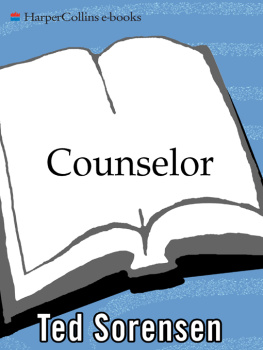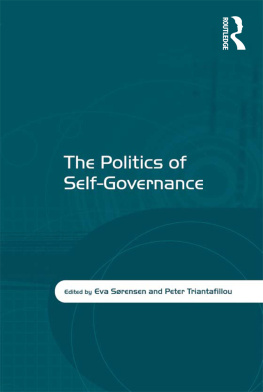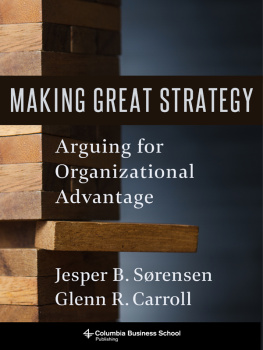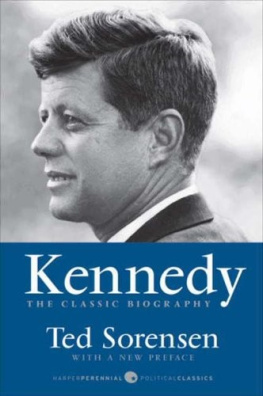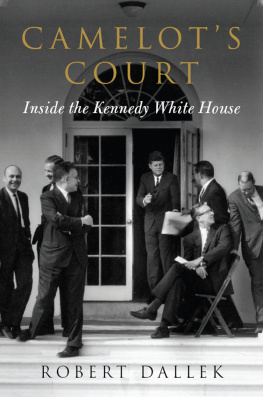Despite some speculation that the Kennedy legacy isnt what it used to be, my recent calendar reflects a warm and welcome resurgence of interest in President John F. Kennedy. There are more books, articles, documentaries, academic conferences, and speeches about President Kennedy all over the world than ever before, declaring his leadership and spirit relevant to both our current hopes and our new president. In addition, the gratifying response to my 2008 memoirs Counselor: A Life at the Edge of Historyboth in literary reviews and reader mailhas been extraordinary, showing interest among those too young to remember Kennedy and nostalgia among those who do. On college campuses, I find theres a yearning and delight to learn that not long ago we had a president globally respected, who was true to his progressive ideals and dedicated not simply to party and self but to a better country and world, a champion of peace who never resorted to war.
As a candidate, Obama frequently invoked Kennedys name, speeches and goals, and he successfully utilized endorsements from JFKs daughter Caroline and brother Edward.
Not long after JFKs death, I predicted that his accomplishments would impress future generations only if intervening generations built on his foundation. Instead a series of failed and flawed presidencies made Kennedys stand out all the more: Lyndon Johnson, whose reversal of Kennedys policy not to send combat troop divisions into Vietnam required him to withdraw from the 1968 election; Richard Nixon, whose sponsorship of the multiple high crimes and misdemeanors collectively known as Watergate required him to resign his presidency soon after reelection; Gerald Ford, whose inability to match Kennedys stabilization of the economy caused him to serve less than one full term; Jimmy Carter, whose setbacks both at home and abroad limited him to one term; Ronald Reagan, whose stumble into the Iran-Contra scandals clouded his final term; George H.W. Bush, whose economic mismanagement limited him to one term; Bill Clinton, whose notoriety as the first elected president to be impeached by the House of Representatives tarnished a man of talent; and George W. Bush, whose incompetence and ideological rigidity led to needless wars and economic collapse, causing him to be ranked by historians below Buchanan, Harding, and Hoover.
Barack Obama paradoxically is much like John F. Kennedy:
Kennedy, like Obama, began testing the presidential waters while still a young Harvard graduate relatively new to Washington. Neither had executive experience but both had lived abroad, gaining perspective on Americas world role.
Kennedy, like Obama, was told that he was too young and should wait four or eight years by accepting second place.
Kennedy, like Obama, was told that his successful and soaring speeches were just words, mere rhetoric.
Candidate Kennedy, like candidate Obama, was a United States Senator in a country consistently looking to former governors, vice presidents, generals, and cabinet members for presidents.
Kennedy, like Obama, faced an apparently insuperable demographic obstacle to victory, in Kennedys case his religion. This 1965 book is a sad reminder of the unreasoning fears of a Catholic presidency in 1960. That fear largely disappeared, not merely because he won but because his service as president proved there was no basis for bigotryand that helped pave the way for Obama forty-eight years later.
Kennedy, like Obama, was a leader who knew the meaning of loyalty, both upward and downward. JFK always defended his aides whenever we were attacked, and earned a devoted team loyalty, diminishing unauthorized leaks during his lifetime and the usual sniping in his teams published recollections after his death.
Kennedy, like Obama, had a sense of history, helping him distinguish major from minor crises and useful allies from cheerleaders. He also appreciated world history, preserving Egyptian relics that would have been flooded by the Aswan Dam.
As president, Kennedylike Obama in his first yearwon international respect and domestic confidence, including the confidence of consumers and investors.
Kennedy, like Obama, believed in diplomacy and negotiations, even with adversaries, and entrusted our ambassadors with those negotiations.
Kennedy, like Obama, was a strong leader, leading by exhortation, example, extraordinary compassion, competence, and innovation, never by asserting extra-legal powers.
Kennedy, like Obama, was cautious in adopting ideological labels, but ultimately accepted pragmatic liberal, despite his partys nervous avoidance of that last word.
Kennedy, with his ever-present gentle sense of civility and humor, disarmed his critics and defused the usual partisan bitterness. Fortunately, the memory of his successful leadership has survived thousands of false reports, which according to polls, failed to diminish his standing among most thoughtful American citizens and historians.
No one alive on that terrible day, November 22, 1963, can forget when he or she heard the awful news. There is still a sense of in-completion about Kennedys life and presidency, a sense of promise cut off.
Rereading the epilogue of this first book reminds me, as did writing the chapter on JFKs death in Counselor, of all that our world lost with his murder.
None of the dozens of conspiracy theories about his assassination provided any solid evidence to change the sad conclusion that we simply do not know. Even sadder is the ability of Americas gun lobby, long after the assassinations of JFK, RFK, and MLK, to block any serious limitation on the flood of murder weapons freely sold in this country.
Some authors have speculated that Kennedys assassination was the work of powerful financial, military and intelligence community interests who feared that Kennedy might reverse not only racial discrimination but also anti-Communist belligerence. If history ever proves that horrific thesis correct, and those conspirators hoped by killing Kennedy to block the civil rights and peace movements in this country, one thing is clearthey failed. The United States is now trading and negotiating with Russia, under an African American president.
This is the first time that I have reread every page and word of this book since completing it in 1965. I am happy to say I find its not badwhich readers of my new book, Counselor, know is my highest form of praise. Today I would not change a word of this book, including its evaluations of JFK and his presidency. True, Counselor is better in sorting out his policy priorities with more perspective, contains more about Kennedys personal life and mine, more about the Cuban Missile Crisis, the presidential campaign and transition, and more about my strained relations with a few White House colleagues. However, I find no outright contradictions between the two books, almost no duplication and few if any words or claims that I would recant.
This book is more factual about Kennedys health than I remembered. Any subsequent critic who claimed cover up apparently failed to catch this books multiple hints about his medical problems. Theres also more here than in my new one about Kennedys role as a United States Senator, including his failure to vote on the Joe McCarthy censure, and his landmark speeches on Algeria and Indochina, warning America and the West against futile military involvement in Asian countriesapplicable to Iraq, Pakistan, and Afghanistan todaywho are determined never to permit again the military and political domination they suffered under colonialism.
Appendix A of this book reminded me how much JFK as president accomplished in Congress, despite a Dixiecrat-Republican majority. He laid the groundwork for the first important break since Abraham Lincoln in the discrimination and segregation faced by our black citizens. He was the first to address the needs of the developmentally disabled (spurred by the efforts of his sister Eunice and the history of their sister Rosemary), the last national attention to this issue until the Republicans in 2008 nominated Sarah Palin of Alaska for vice president.


